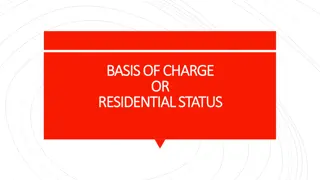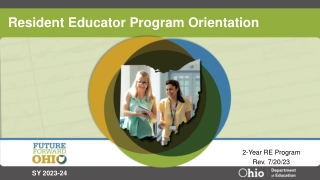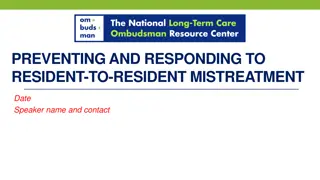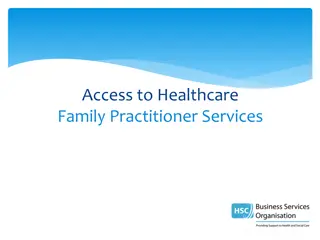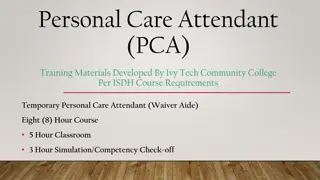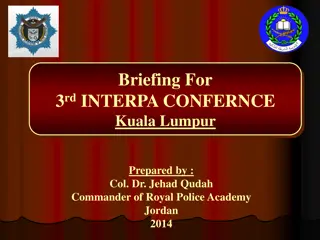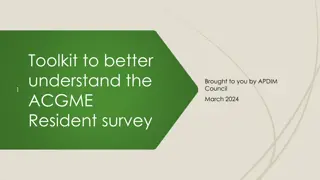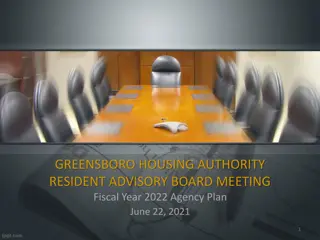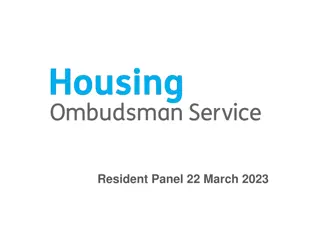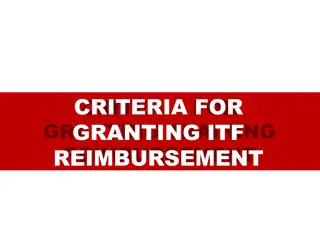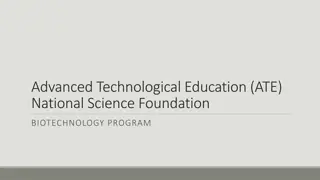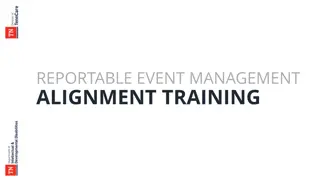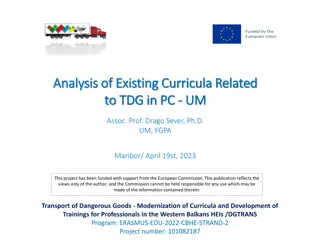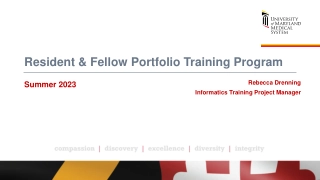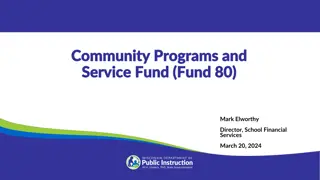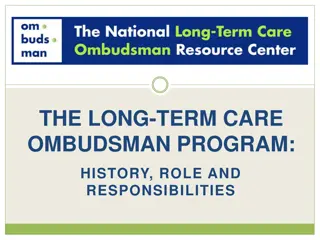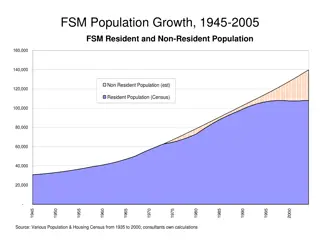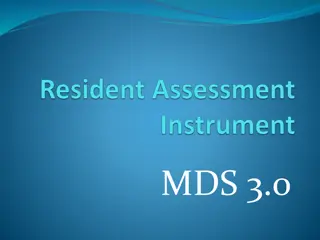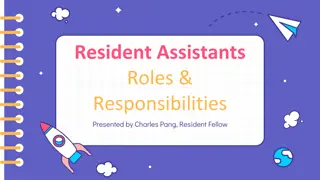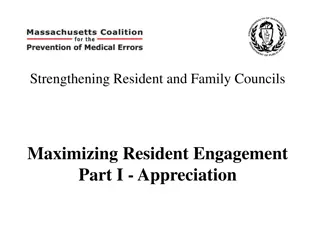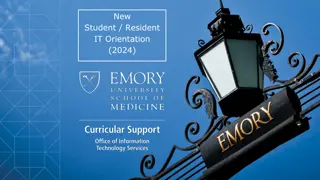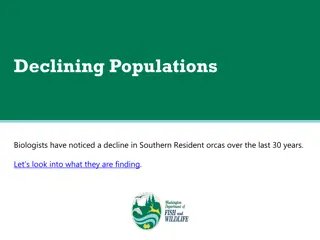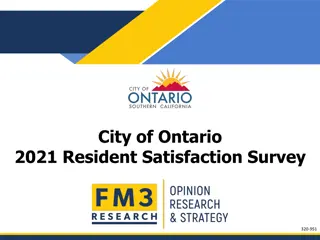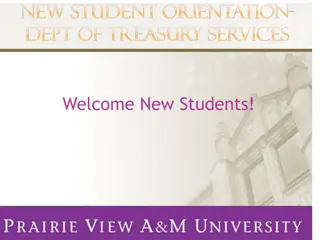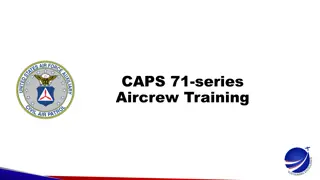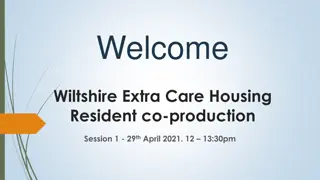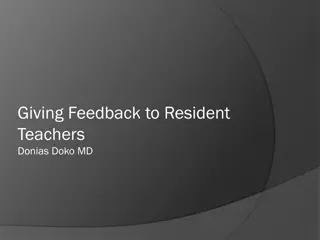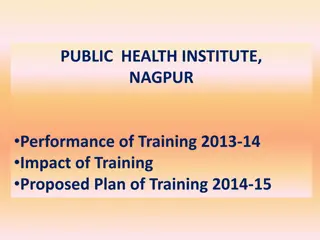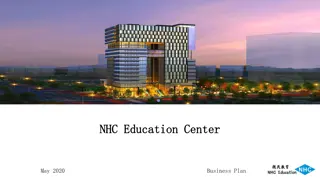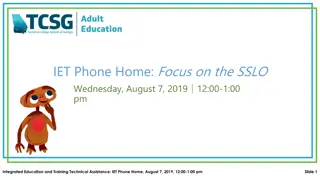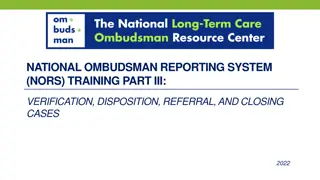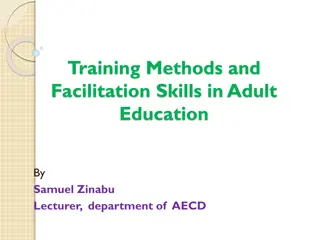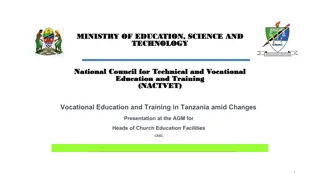Insights into Resident Education and Training Programs
Discover the comprehensive resident orientation and announcements, along with tips for residents supervising clinical clerks and supporting medical students, provided by the Southwestern Ontario Medical Education Network. Learn about the role of residents and the tracking forms used in family medicine training, as well as how to address any questions or concerns. Stay informed about the SWOMEN program and its initiatives in medical education and training.
Download Presentation

Please find below an Image/Link to download the presentation.
The content on the website is provided AS IS for your information and personal use only. It may not be sold, licensed, or shared on other websites without obtaining consent from the author. Download presentation by click this link. If you encounter any issues during the download, it is possible that the publisher has removed the file from their server.
E N D
Presentation Transcript
Resident Orientation Jamie Wickett, Postgraduate Co-Director Eric Wong, Postgraduate Co-Director 1
Announcements Postgraduate Co-Directors Accreditation Oct 2012 Chief Resident, Windsor Program Dr. Vince Ruisi Chief Resident, London Urban Program Dr. Sarah Kawaguchi Chief Resident, London Regional/Rural Program Dr. Justin Mall Package 2
Webcast Participants Questions during the presentation email Kelsey.klages@schulich.uwo.ca to be answered 3
Greetings Undergraduate Program SWOMEN 4
Greetings from Undergrad!! All residents play a vital role in teaching clinical clerks who rotate through the Academic Family Medical Centres. Thank you for doing your part. Here are a few things to keep in mind, as you have students with you.
Your Role If you are uncomfortable supervising clinical clerks, please let your supervisor know. All clinical clerks have a set of objectives that inform their learning experience. You may review the objectives which are available online
Your Role Students progress through family medicine is also tracked with their own tracking form, which you may be asked to sign which you are allowed to do These tracking forms are not meant to declare that a student is competent in a skill, but rather, that they have been exposed to the skill
Questions? If you have any questions about the teaching experience or about a student, please do not hesitate in contacting me. Thanks again! George Kim, Undergraduate Academic Director George.kim@schulich.uwo.ca
SWOMEN SWOMEN = Southwestern Ontario Medical Education Network Provides training experiences in the rural/regional settings to Western learners 9
SWOMEN SWOMEN & FM: Funds mileage/accommodations/preceptor for any rotation in Windsor Funds PGY1 & 2 specialist elective rotations outside of London Funds PGY3 rotations for specialist rotations outside London 10
Objectives Familiarize you with major aspects of the 2 years ahead 11
Important Contacts Dr. Stephen Wetmore Dr. Jamie Wickett Dr. Eric Wong Dr. Nelson Chan Dr. Julie Copeland Dr. Dale Ziter Dr. Lawrence Aoun Dr. Daniel Grushka Dr. Tania Rubaiyyat Chair Postgraduate Co-Director Postgraduate Co-Director Accreditation, Academic Program ,Evaluation London Urban Program Director Rural/Regional Program Director Windsor Program Director Windsor Assistant Program Director Enhanced Skills Program Director IMG Coordinator 12
How to contact? Non-Windsor Residents fmpgc@schulich.uwo.ca, 519-661-2037 If personal, can ask for direct contact with specific faculty Windsor Residents Ms. Tiffany Walsh, Family Medicine Education Assistant - Post Graduate Education Ms. Debbie Curran, Family Medicine Secretary - Post Graduate Education 13
Important Contacts Fred Ross Postgraduate Education Coordinator & Academic Program Coordinator fred.ross@schulich.uwo.ca Sharon Story Scheduling & Student Relations Coordinator sharon.story@schulich.uwo.ca Lin Hill Recruitment & Event Planning Coordinator lin.hill@schulich.uwo.ca Liz McInnis Pre-residency Program Coordinator liz.mcinnis@schulich.uwo.ca Dianne Brooks Program Assistant dianne.brooks@schulich.uwo.ca Kelsey Klages Resident Project Coordinator kelsey.klages@schulich.uwo.ca Pat Yong Finance Coordinator pat.yong@schulich.uwo.ca 14
Resources Email UWO.ca *.londonhospitals.ca 15
Resources 16
Minimum Requirements Pass all rotations Complete academic program Complete residency project Complete procedures policy requirements Complete obstetric policy requirements Complete faculty advisor meetings Complete direct observations requirements Residency & rotation objectives are here 18
Program Structure Refer to specific program descriptions Each rotation is 4 weeks long There are 13 rotations per year; 26 rotations in your entire residency Changeover = Tuesday 19
Program Structure Enhanced Skills Emergency Medicine Academic family medicine FM Anesthesia Sport & exercise medicine Care of Elderly Child Health Chronic disease management Palliative care (mostly Windsor) Women s Health Obstetrics Hospitalist (Windsor) Self-designed 20
Successful completion Successful completion of all clinical rotations = NOT rated unsatisfactory/Does not meet expectations or Borderline (Multiple) Categories of ratings: Does not meet expectations/Unsatisfactory Borderline Meet expectations Above average Outstanding
Successful completion Official failure = unsatisfactory/does not meet expectations This requires formal remediation process Can be appealed Borderline ratings An alert is sent to program and evaluation is reviewed PG Exec Committee coordinates any action that needs to be taken
Successful completion You MUST be your own advocate for your learning needs Especially true in community-based rotations and off-service rotations Tell EVERYONE, especially nurses, that you re there and present!!! 23
Selectives vs. Electives Selective = Limited to within Southwestern Ontario Elective = Can be taken out of Southwestern Ontario, up to 3 maximum 24
Electives Research Elective 4 weeks maximum Must follow guidelines in resident handbook Vacation Elective 1 rotation s worth, 4 weeks Still has 7 days of conference leave Out-of province Elective Can do 1 rotation Mandatory pre-departure training (http://www.schulich.uwo.ca/GLOBALHEALTH) You can spend a total of 3 rotations outside of Southwestern Ontario (LHINs 1 & 2) 25
Electives Special Interest Elective: Emergency Medicine Focused on acute care skills; airway management and resuscitation with SimMan Proposals accepted 26
Horizontal Electives in PGY2 To qualify: Train in either London, London Regional or Windsor Program Must be performing well in residency as judged by rotation evaluations Preceptor must agree to choice of elective Max. of 6 half-days during 4-month FM block @ 1 half-day per week 27
FM Rural Mandated by CFPC Occurs in PGY2 year London Regional, Chatham-Kent, Stratford, Tavistock, Rural program residents get 8 weeks of rural FM elective time Eligible rotations (consult resident handbook): In our catchment area with preceptor with appointment or via Northern Ontario Electives program, or Rural Ontario Medical Program Not in city/town with academic centre/tertiary care hospital Preceptor must work in >=2 settings in addition to office: inpatient, ER, delivery, housecalls, surgical assisting, GP-anesthesia, nursing home/chronic hospital care 28
Academic Program Model: self-directed learning, like real- life CME for family practice Monitoring: Minimum of 150 hours / 150 credits of eligible educational activities in prescribed criteria per year (total 300 credits) Must regularly log activities online Must maintain proof of participation (e.g. certificates) 29
Academic Program Cannot graduate unless complete all credits + evaluation of academic program Teaching Schedule Protected time every Wed 1-5 pm 30
Academic Program Eligible activities: Academic sessions Protected time from ALL clinical rotations Must fill-out on-line evaluation within 2 weeks of attendance to get credit ~1 mandatory session per month 31
Academic Program Eligible activities: Reading (journals, books, guidelines, McMaster modules, audio/video tapes, CFPC programs) Educational sessions organized by residents & staff physicians (during FM block time) Accredited conferences/courses/workshops: in person or on-line 32
Academic Program Eligible activities: Hospital rounds Departmental Grand Rounds (1st Wed of each month 8:30-9:30 Shuttleworth) Research/Publication (excludes residency project) ACLS, ATLS, NRP, PALS, ALSO, ALARM, ACoRN, etc. Practice audits/quality assurance (excludes department audits) 33
Academic Half-Days 1 Wed pm per month from 1 to 5 pm 2-3 topics per session Credits automatically logged Mandatory attendance: Attendance will be taken for those attending in person and also collected for those that are attending by webconference (Blackboard) electronically Within 40 km of London: attend in person Greater than 40 km from London: webcast 34
Academic Program Online logging system: http://ahd.uwofm.ca/ To get password: Enter UWO email address Click Forgot your password an email with your password will be sent to your UWO email address 1-2 random audits per year to verify records Update of credits provided by email Dec/June Complete Credits 1 month before end date 35
Academic Program - Evals Academic Half-Day Sessions: Evaluations via One45 will be sent out to you the day of the session and be available for 14 days after 36
Academic Program Ethics Curriculum: Taught by Mr. Robert Sibbald, a clinical ethicist at LHSC One 3 hour session per Family Medicine rotation Attendance mandatory Web-based modules to be developed Schedule in One45 and will be emailed to you 37
Academic Program Palliative Care Curriculum: Mandatory in most programs Two 3 hour seminars during Academic Half Day Schedule (Sept, Oct) Attendance mandatory Schedule in One45, and Windsor residents will be notified of their own schedule 38
Academic Program Behavioural Medicine Curriculum: Three 3 hour sessions per Family Medicine rotation Attendance mandatory Variety of topics see schedule on-line Mainly small group sessions Focus on interviewing and communication skills through taped patient encounters and group discussion Schedule in One45, Windsor residents will be notified of their own schedule 39
Academic Program Continuous Quality Improvement: 6 online modules completed by 1st week September Approximately 8 hours 40
Academic Program Transition to Residency Series: Mandatory educational sessions hosted by the Postgraduate Medical Education Office on the CanMEDS roles in July/Aug http://www.schulich.uwo.ca/medicine/postgradu ate/academic-half-day-transition-to- residency/files/Linked/Transition%20to%20Reside ncy%20Draft%20Poster%20update_1_3.pdf 41
Resident Project - CQI Work in Groups at home Family Medicine site (groups up to 5 residents) PGY1 Complete and submit Resident Project proposal to the Department ideally before the end of May, PGY1. PGY2 Residents are required to present their progress to date at a Resident Project Progress Day in November/December Residents are required to submit the final version of their Resident Project by end of March, PGY2 ( 6-8 double-spaced pages in total not including references Residents are required to give a presentation (10 mins presentation with 5 mins for Q and A) of their project at Resident Project Day in June. 42
Procedures in Family Medicine List in Handbook/Website Core and Enhanced lists http://ahd.uwofm.ca/login.asp?accessd enied=/procedures/Default.asp Must have learned or performed each of the core procedures Will have incomplete status in program until completed will delay licensure 43
Procedures in Family Medicine Curriculum: 1-2 small group based teaching sessions during FM block time Use of DVD/online videos to aid instruction http://www.primarycareprocedures.com/ Each teaching unit does procedures 44
Obstetrics Policy >=3 deliveries with family medicine preceptor Experience during FM block time: London: FMC preceptor, Women s Health Clinic @ LHSC-VC Mount Brydges/Strathroy: Strathroy OB clinic Tavistock: None Windsor: None Ilderton: None Petrolia, Hanover, Goderich, Chatham-Kent, Stratford: part of regular FM training If incomplete will need to show that had adequate exposure to FM-OB role model and # of deliveries during OB rotation 45
Obstetrics Policy Experience outside FM block time: Use your FM selective or electives and choose FM preceptor who does OB Evaluations/logbook: http://ahd.uwofm.ca/ 46
Faculty Advisor Program Why? To provide longitudinal mentoring and support throughout residency Who? FM preceptor = default FA Can speak with PG director, R/R coordinator, chief resident to switch What? 3 meetings during PGY1 2 meetings during PGY2 47
Direct Observations Each resident must have 32 documented direct observations by faculty over residency (4 per month of training) 2 of 32 have to be electronically recorded and documented Documentation signed by resident and evaluator Joint responsibility of resident & direct supervisor to ensure completion of observations Some preceptors will be better than others in keeping track, so you can take things into your own hands and remind your preceptor if necessary, observation forms are here. All signed forms must be submitted either to your preceptor or his/her secretary for safe-keeping 49
Other Policies Not related to residency completion requirements


